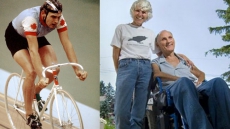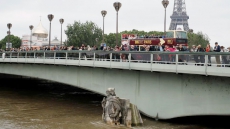DOHUK, Iraq — The walls and even the windows of Bahzad Farhan Murad's office are covered with lists. They name the thousands of people who were killed or are still missing after the Islamic State group launched an attack on unarmed Yazidi communities in northwestern Iraq nearly two years ago.
The 28-year-old Yazidi has been documenting crimes against his community ever since the August 2014 attack. He is collecting data on as many victims as he can, gathering information on the men who were executed in groups, the women who were captured and forced into sexual slavery, the children who were indoctrinated in extremist training camps. To date, he has conducted hundreds of interviews and produced detailed files on over 2,400 victims.
Murad says his aim is to help the victims by gathering as much evidence as possible to assist a future criminal prosecution and by preserving the historical record.
"I'm pretty sure that if we don't do it now, after 20 years no-one will remember. And they will say, 'nothing happened to the Yazidis," he said.
Iraq's Yazidi community — a small and isolated religious minority that combines elements of Islam, Zoroastrism and Christianity — has been repeatedly persecuted by successive governments and invading armies. Murad thinks it is crucial to document the most recent massacres in detail.
"I was told several times by my father and grandfather about the massacres that happened to the Yazidis, how they killed the men and took the children and the women. I was reluctant to believe it because it (the story) was told in different ways by different people," he says.

According to the United Nations, about 5,000 Yazidi men were killed by IS militants when they took control of Iraq's northwest two years ago and thousands more, mostly women and children, were taken into captivity. Most of the population — some 400,000 Yazidis — were displaced from their homes.
Murad demonstrated his determination to gather detailed accounts when he recently visited a Yazidi woman in a camp for the displaced on the outskirts of Dohuk, a city in Iraq's semiautonomous Kurdish region. The woman, who asked to remain anonymous because she still fears for her safety, had escaped from the IS-held Iraqi city of Mosul five months earlier. Murad asked her to recount every stage of her capture and time in captivity, repeating every question, checking every detail and then recording the answers on forms.
The woman's family seemed happy to co-operate. Her brother said she doesn't know whether any good will come of Murad's efforts, but that he appreciated his determination to ensure their suffering is recognized.
"The interview was good," Murad said after an hour, emerging from the tent. "But I need to see her two or three more times because she was in their hands for more than a year. I will document every stage of her story."
Murad's quest for detail magnifies what already seems a monumental task.
He photographed each item the woman had with her when she escaped, as he does with all the women he interviews. The pictures go into the victim's file, along with the description of their case and other personal details. Alongside the case files, his home garage has many boxes of these items: the clothes they were wearing, bags, water bottles, even small bank notes.

He says he's aware of the danger of taking on too big a task, but he doesn't think there is another way to document the extent of the atrocity.
"Everything — the massacres, the disappearances — is connected with everything else. It has to be documented in its entirety," he said.
Murad works independently and is self-funded, helped by a few volunteers. Coming from a well-off family, he says he doesn't have to worry about money and has nothing else to do.
The files are not yet being published; he says he's merely at the stage of collecting information. He is tentatively planning to display the objects in a museum and publish the case files on a website. Various other Iraqi organizations are also working to document the massacres and disappearances, and Iraq's Kurdish regional government has exhumed some of the mass graves in which dozens of murdered Yazidi men are buried.
The size of the job doesn't seem to deter Murad, although he admits that he has felt briefly overwhelmed at times.
"We have to prove for history that it was the fully-planned intention of IS to eliminate the Yazidis, to commit genocide against them. It is for history and for our next generations to know what happened to us," he said.



